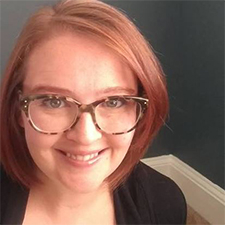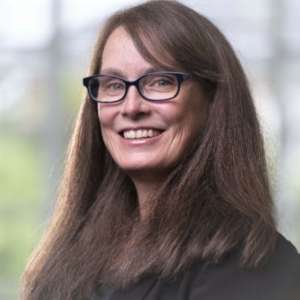The Digital Election

The presidential campaign is close to the finish line and Keene State students are reaching for their smartphones to keep track of the latest news regarding the candidates. Everywhere we turn, there’s another developing story about GOP nominee Donald Trump or Democratic hopeful Hillary Clinton. Amber Davisson, assistant professor of communication and philosophy at Keene State, has encouraged her students to be more disciplined, taking the time to learn about each candidate’s history instead of just digesting the daily rhetoric and sensational sound bites that grab headlines but lack perspective.
“Most are trying to grapple with what’s in front of them. They don’t have a long memory of Hilary Clinton, so they are trying to understand this very complex person and they are doing it in very narrow ways,” she said. “They have a lot of catching up to do.”
Trump supporters don’t have it any easier. “He has a whole phrase of ‘Make America Great Again’ and seems to imply nostalgia for history that may or may not have existed,” Davisson said.
Regardless of political affiliation, candidates continue to embrace digital media, ensuring that no news cycle lacks fodder for pundits to analyze and dissect.
A debater in high school and college, Davisson started writing about YouTube the year it came into existence (2006), examining how candidates were learning to campaign on line. Two years later during the 2008 primary election between Hillary Clinton and Barack Obama, Davisson looked at the learning curve that both candidates faced embracing social media and discovering the networks that would take their message from bloggers to mainstream media. “They were actually pretty sophisticated pretty early,” said Davisson about the micro-targeting they engaged in. “Everybody was learning how to play the game.”
Consulting Firms Help Shape the News
Davisson says Democrats have had the upper hand in recruiting people from the tech industry to join forces in partisan consulting firms. The consulting firms are not only crucial in developing databases that identify people most likely to go to the polls, but also build and galvanize communities around candidates. Some, like Blue State Digital, have become adept at monitoring conversations online and releasing them to broad networks who in turn cause a bubbling and trending effect that is picked up by news organizations like CNN, MSNBC or Fox, resulting in a domination of the daily news cycle. A dead news cycle can be reinvigorated by creating an online news story that takes on a life of its own.
A Word to the Wise
Popular political discourse is shrinking to fit smartphone screens. Seizing the opportunity, campaigns will go to any length to provide the Instagram or Facebook photo or comment to get the upper hand in the Twitter war. Davisson warns her students to play devil’s advocate, figuring out whether what they are seeing or reading is fact or opinion or a framing device. “I tell my students it seems really scary because everything appears to be so immediate – everything has changed and everything is new,” said Davisson. “But if you can just pull back and look at the bigger picture, nothing has really changed.”





